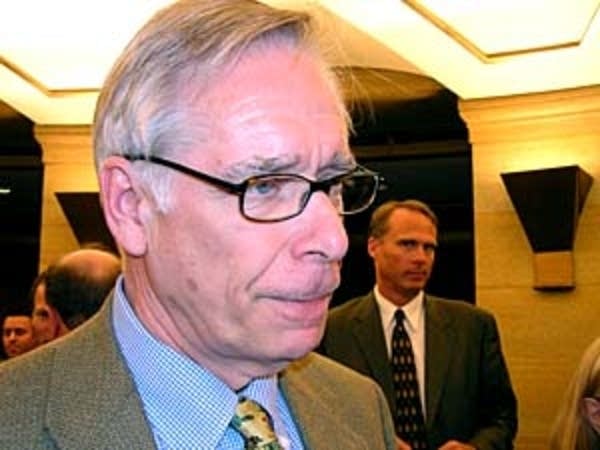Senate committee throws curveballs at stadium plans
Go Deeper.
Create an account or log in to save stories.
Like this?
Thanks for liking this story! We have added it to a list of your favorite stories.

It was a short honeymoon for the Minnesota Twins. One day after the House approved a plan that would help pay for a downtown Minneapolis ballpark, the Senate author of the bill stopped the Twins momentum with a different funding plan.

Sen. Steve Kelley, DFL-Hopkins, says he's moving away from a deal between Hennepin County and the Twins that would rely on a countywide sales tax. Instead, he's proposing a half-cent sales tax for the seven-county metro area to fund the ballpark for the Twins and a Blaine stadium for the Vikings, and provide $12 billion for transit funding over the next 30 years.
"I think this is a better solution for Minnesota and for taxpayers than the other solutions, where you are issuing lots of debt and have all of the interest costs related to that," said Kelley.
Kelley's idea is a dramatic departure from what the Twins and Hennepin County are proposing. The county wanted a .15 percent sales tax to pay for three-quarters of the $522 million stadium. Twins owner Carl Pohlad would contribute $130 million to the project.
Turn Up Your Support
MPR News helps you turn down the noise and build shared understanding. Turn up your support for this public resource and keep trusted journalism accessible to all.
Since that plan has been approved by the House and endorsed by Gov. Pawlenty, it appeared that the Twins ballpark would cruise through a Senate that has been friendly to stadium legislation in the past.
At some point it doesn't matter whether you do one stadium or three. At some point it's going to happen or not. I think the mood is there to just get it done with.
Kelley and other supporters say his restructured deal will pick up support from lawmakers who are skeptical of using taxpayer money to build a stadium.
Sen. Don Betzold, DFL-Fridley, says Kelley's proposal would also ensure that lawmakers could finally resolve the stadium dilemma for the Twins and Vikings. He's confident a stadium plan for the University of Minnesota will also pass.
"At some point it doesn't matter whether you do one stadium or three. People aren't any happier or less happier," says Betzold. "At some point it's going to happen or not. I think the mood is there to just get it done with."
But Sen. Debbie Johnson, R-Ham Lake, warned Kelley that his attempts to combine plans for the Vikings and Twins could result in nothing for either team.
"Senator Kelley, taking a gamble on the Vikings after all of the work you did on the Twins might be a very big gamble," Johnson says.
That's a gamble some Twins supporters aren't willing to take, since a recent court ruling said the Twins can leave the Metrodome at the end of the season.
Members of the Hennepin County Board were diplomatic about the latest proposal. They said it wasn't their first choice, but understand things change in the legislative process.

Senate Minority Leader Dick Day, R-Owatonna, was a bit more forthright. He said Twins fans can blame Senate DFLers if the Twins ballpark doesn't go through this year.
"If we're here on May 22 and all of this goes under, it's going to come right back to Senator Pogemiller and Senator Johnson, who's the caucus leader that says we're going to get these bills out of here and keep them moving and whatever," said Day.
Republican House Speaker Steve Sviggum says his caucus is also 100 percent against the proposal.
While Twins supporters may have some heartburn over the latest development, the University of Minnesota also suffered a setback. That's because the Senate Taxes Committee defeated a financing plan for the U's proposed on-campus football stadium.
Instead, committee chairman Larry Pogemiller proposed a 13 percent sports memorabilia tax to raise the annual state payment to the stadium. The rest would be paid by private contributions.

Supporters of the sports memorabilia tax say it's a way to fund the stadium without relying on general fund dollars like the House version does. But every Republican on the committee, along with one DFLer, voted against the measure. -- and it died on a tie vote.
Sen. John Marty, DFL-Roseville, said it was unreasonable for the state to spend $12.9 million a year so the Gophers can play six football games a year in a new stadium.
"I just think $2 million per home game is awfully steep, with all of the priorities that government faces," Marty said.
University of Minnesota President Bob Bruininks says he'd prefer to see some of their original ideas put back into the bill.
The House earlier passed a plan under which the state would contribute $9.4 million a year to pay for half of the stadium's cost. In exchange, the state would gain rights to 2,800 acres of undeveloped land in Dakota County.
The university has promised to pay for its half through a $35 million naming rights deal with TCF Bank, private contributions and student fees.
The defeat of the Gopher stadium proposal in the Senate Taxes Committee is seen as a small setback. In fact, Chairman Larry Pogemiller confidently predicted that stadium legislation for all three teams will be approved by his committee. He said he was willing to work into the weekend to make sure that happened.
Dear reader,
Political debates with family or friends can get heated. But what if there was a way to handle them better?
You can learn how to have civil political conversations with our new e-book!
Download our free e-book, Talking Sense: Have Hard Political Conversations, Better, and learn how to talk without the tension.




